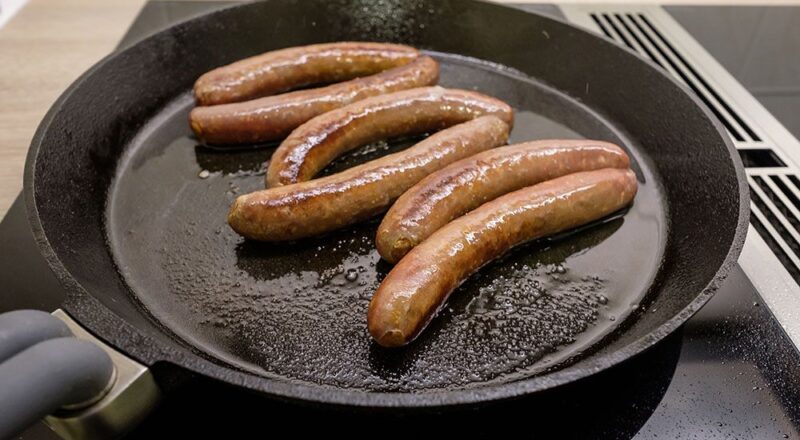Many cooking enthusiasts and professionals often ponder, will cast iron warp on induction cooktops? It’s a valid question given the popularity of both cast iron cookware and induction cooking. Understanding how these two interact is crucial for anyone looking to maintain their kitchenware and ensure optimal cooking results.

The Basics of Cast Iron and Induction Cooking
Before diving into whether cast iron will warp, it’s important to understand the basics. Cast iron cookware is renowned for its durability and excellent heat retention. On the other hand, induction cooktops use electromagnetic fields to heat pans directly, offering rapid temperature adjustments. This unique method of heating can sometimes raise concerns about the effects on certain cookware, especially cast iron.
How Induction Cooking Affects Cast Iron
Induction cooking is known for its efficiency and precision. However, the direct and often rapid heating can lead to potential issues with some materials. Cast iron, while robust, can be susceptible to warping if not used correctly on induction cooktops. The rapid temperature changes can stress the metal, particularly if the cookware is heated too quickly or unevenly.
Understanding Warping
Warping occurs when metal deforms due to uneven heating or cooling. In the case of cast iron, this can happen if the pan is exposed to sudden temperature changes. For instance, placing a cold cast iron skillet on a hot induction burner can cause stress and lead to warping.
Preventing Warping in Cast Iron
To prevent warping, it’s essential to follow some best practices when using cast iron on induction cooktops. First, always preheat the pan gradually. This means starting with a low heat setting and slowly increasing it to the desired level. Additionally, avoid placing a hot pan directly under cold water, as this can cause thermal shock.
Proper Heating Techniques
Using the proper heating techniques can greatly reduce the risk of warping. It’s advisable to let the pan come to room temperature before placing it on the cooktop. Moreover, using a burner that’s similar in size to the pan ensures even heat distribution, reducing stress on the metal.
Common Myths About Cast Iron on Induction
There are several myths regarding the use of cast iron on induction cooktops. Some believe that all cast iron will warp on induction, which isn’t entirely true. While there’s a risk, proper care and usage can prevent any issues. Understanding the nature of both the cookware and the cooktop is key to successful cooking.
Debunking Myths
One common myth is that induction cooking is inherently bad for cast iron. In reality, when used correctly, induction can be an excellent method for cooking with cast iron due to its precise temperature control.
Signs of Warping and How to Address Them
If you suspect your cast iron has warped, there are some signs to look for. A wobbly base, uneven cooking, or a pan that doesn’t sit flat are indicators of warping. Unfortunately, once a pan is warped, it can be challenging to fix. However, using the pan for specific tasks where a flat surface isn’t crucial can extend its usability.
Maintenance Tips
Regular maintenance can help prevent warping. Keep your cast iron seasoned and clean, and store it properly to avoid any undue stress on the metal. For more detailed tips on maintaining your cast iron, you can check out this cast iron guide.
Choosing the Right Cookware for Induction
Not all cast iron is created equal. When selecting cookware for induction cooking, ensure that it has a flat base and is of high quality. Thicker bases tend to resist warping better than thinner ones. It’s also beneficial to choose well-seasoned cast iron, as this can enhance the cooking experience on induction.
Brands and Options
Some brands are specifically designed for induction cooktops. Researching and investing in such cookware can alleviate concerns about warping. For more options and brands that work well on induction, visit this detailed resource.
Conclusion: Balancing Benefits and Risks
While the question will cast iron warp on induction is valid, it’s important to weigh the benefits against the risks. Cast iron offers excellent cooking qualities, and when used correctly on induction cooktops, it can provide fantastic results. By understanding the nature of both the cookware and the cooktop, you can enjoy the best of both worlds.

FAQ
1. Can I use any cast iron pan on an induction cooktop?
Yes, most cast iron pans are compatible with induction. However, ensure the base is flat for optimal heat transfer.
2. What are the signs my cast iron is warping?
Look for a wobbly base, uneven cooking, or a pan that doesn’t sit flat.
3. How can I prevent my cast iron from warping?
Preheat gradually, avoid thermal shock, and use proper maintenance techniques.
This article contains affiliate links. We may earn a commission at no extra cost to you.

